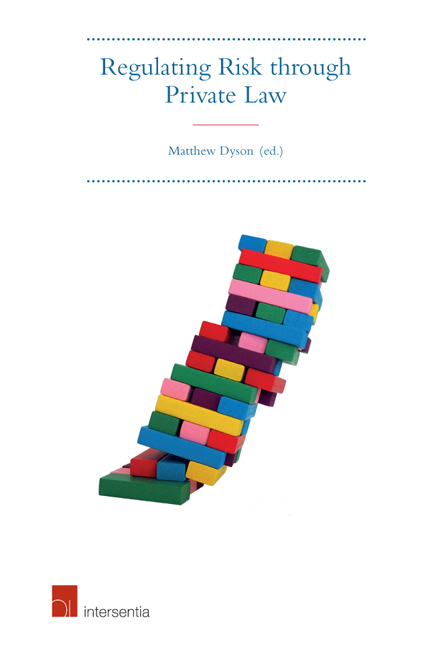Book contents
- Frontmatter
- Preface
- Contents
- Table of Cases
- List of Contributors
- Chapter 1 Introduction
- Part I Risk Overviews
- Part II State of the national art on risk
- Chapter 11 Legal Risk in International Commercial Disputes
- Chapter 12 Medical Accidents and Pharmaceutical Product Liability in France
- Chapter 13 Bearing and Sharing Risk in the Swedish Welfare State
- Chapter 14 Modernisation and Risk Regulation in the Italian Food Sector
- Chapter 15 Motor Vehicle Accidents Caused by Game Wandering onto Spanish Roads
- Chapter 16 Dutch Tort Law at the Crossroads: Judicial Regulation of Health and Environmental Risks
- Chapter 17 Sub Terra: Risk in the Chilean Mining Industry
- Chapter 18 Constitutionalising Rights and Reacting to Risk in South Africa
- Chapter 19 Regulating Risk in Brazil: Resort to General Clauses
- Chapter 20 What does Risk-Reasoning do in Tort Law?
- Chapter 21 Epilogue: What does Risk-Reasoning Tell Us about Tort Law?
- Index
- About the Editor
Chapter 20 - What does Risk-Reasoning do in Tort Law?
from Part II - State of the national art on risk
Published online by Cambridge University Press: 13 October 2018
- Frontmatter
- Preface
- Contents
- Table of Cases
- List of Contributors
- Chapter 1 Introduction
- Part I Risk Overviews
- Part II State of the national art on risk
- Chapter 11 Legal Risk in International Commercial Disputes
- Chapter 12 Medical Accidents and Pharmaceutical Product Liability in France
- Chapter 13 Bearing and Sharing Risk in the Swedish Welfare State
- Chapter 14 Modernisation and Risk Regulation in the Italian Food Sector
- Chapter 15 Motor Vehicle Accidents Caused by Game Wandering onto Spanish Roads
- Chapter 16 Dutch Tort Law at the Crossroads: Judicial Regulation of Health and Environmental Risks
- Chapter 17 Sub Terra: Risk in the Chilean Mining Industry
- Chapter 18 Constitutionalising Rights and Reacting to Risk in South Africa
- Chapter 19 Regulating Risk in Brazil: Resort to General Clauses
- Chapter 20 What does Risk-Reasoning do in Tort Law?
- Chapter 21 Epilogue: What does Risk-Reasoning Tell Us about Tort Law?
- Index
- About the Editor
Summary
Reasoning about risk simultaneously challenges and enriches our understanding of private law. For our purposes, ‘risk-reasoning’ has meant analysing or explaining a legal phenomenon by reference to risk. Risk-reasoning might add, alter or take away from the law, but how and why does it do so? The core question this volume has examined is ‘what does risk-reasoning do for tort law’? The book has looked at that question from three perspectives:
1. What is ‘risk’?
2. How do legal systems generate liability from risk-taking?
3. How do legal systems control risk-taking through imposing liability?
This chapter explores how our national legal systems have answered these questions. In short, it appears that risk-reasoning offers two different functions. First, risk has a normative function: it justifies and limits liability. It most commonly does so as a test for fault, by asking what risks were unreasonable to take. It is also often a claim that taking/generating/imposing particular risks which then eventuate can generate liability without regard to fault. Riskreasoning can also have effects on tort law, typically by reconceptualising what has been done to the victim (causation and damage/harm/loss), such as by treating loss of a chance or the imposition of a risk as a harm in themselves. Second, it has a non-normative function: claiming both to be more flexible as a form of reasoning and to better represent the reality that the law must govern.
By way of very simple introduction, we might map our legal systems onto a spectrum of how relevant and how overt their risk-reasoning is. Fuller details follow in the rest of this chapter. As a baseline, all of our systems recognise risktaking as part of finding fault.
At one end, representing a minimal role for risk-reasoning in tort liability, we have South Africa. Risk-reasoning is present within tort law, but not strongly influential. While a leading South African jurist, Van der Walt, did urge risktaking be a general ground of liability without fault, no such development has happened. The strong link to Roman law seems to have been a cultural brake against the development of a wide liability for risk-taking or even a general theory about risk-taking and no such theory is evident. South Africa's uncodified legal system has permitted historical, procedurally determined categories which resist substantive analysis and inhibit a unified pan-delictual theory of risk.
- Type
- Chapter
- Information
- Regulating Risk through Private Law , pp. 455 - 512Publisher: IntersentiaPrint publication year: 2018



